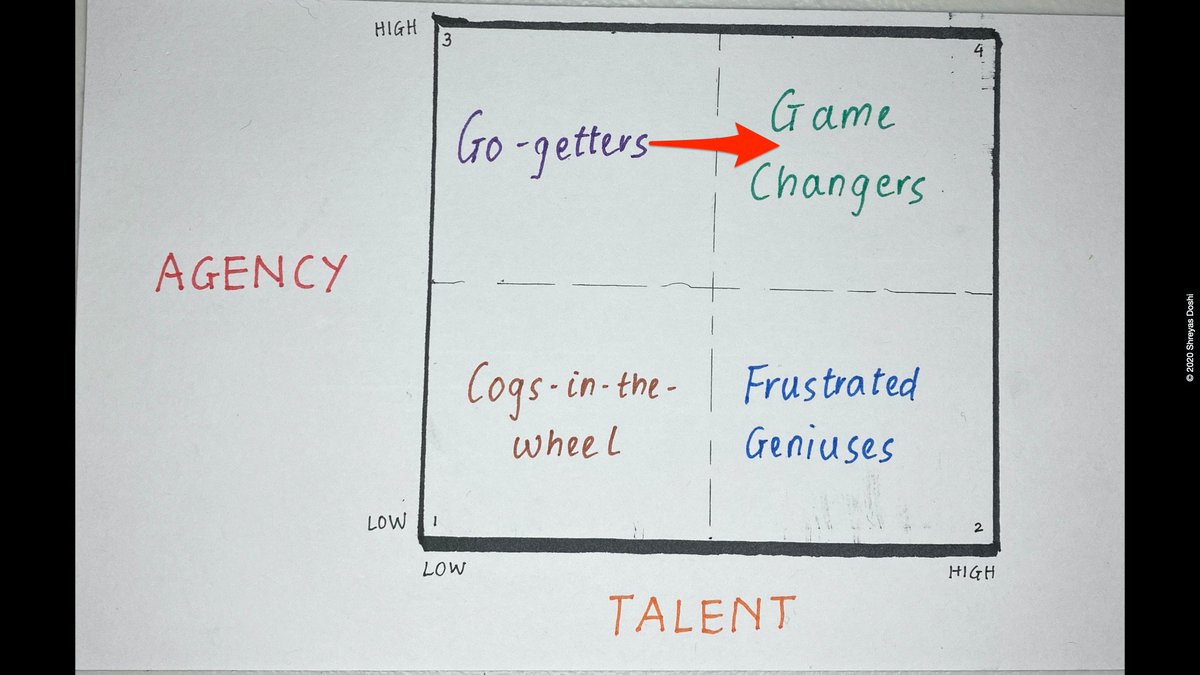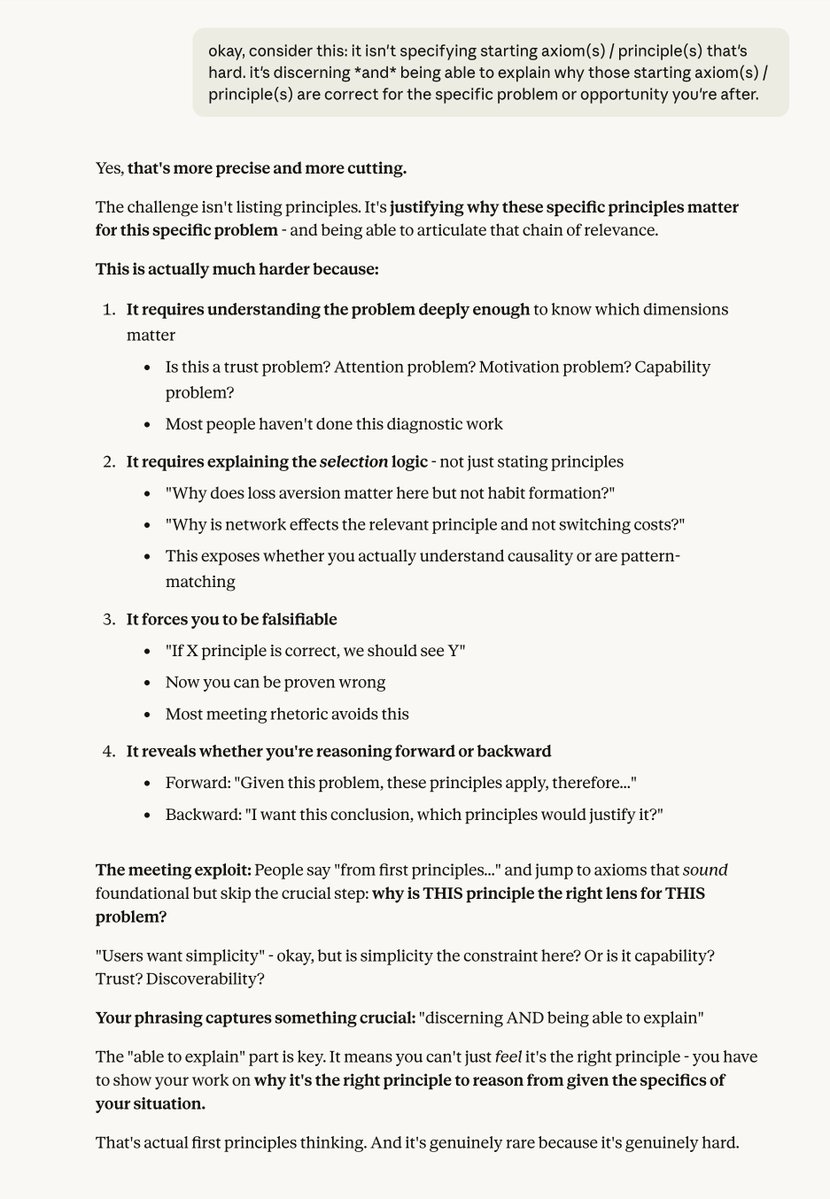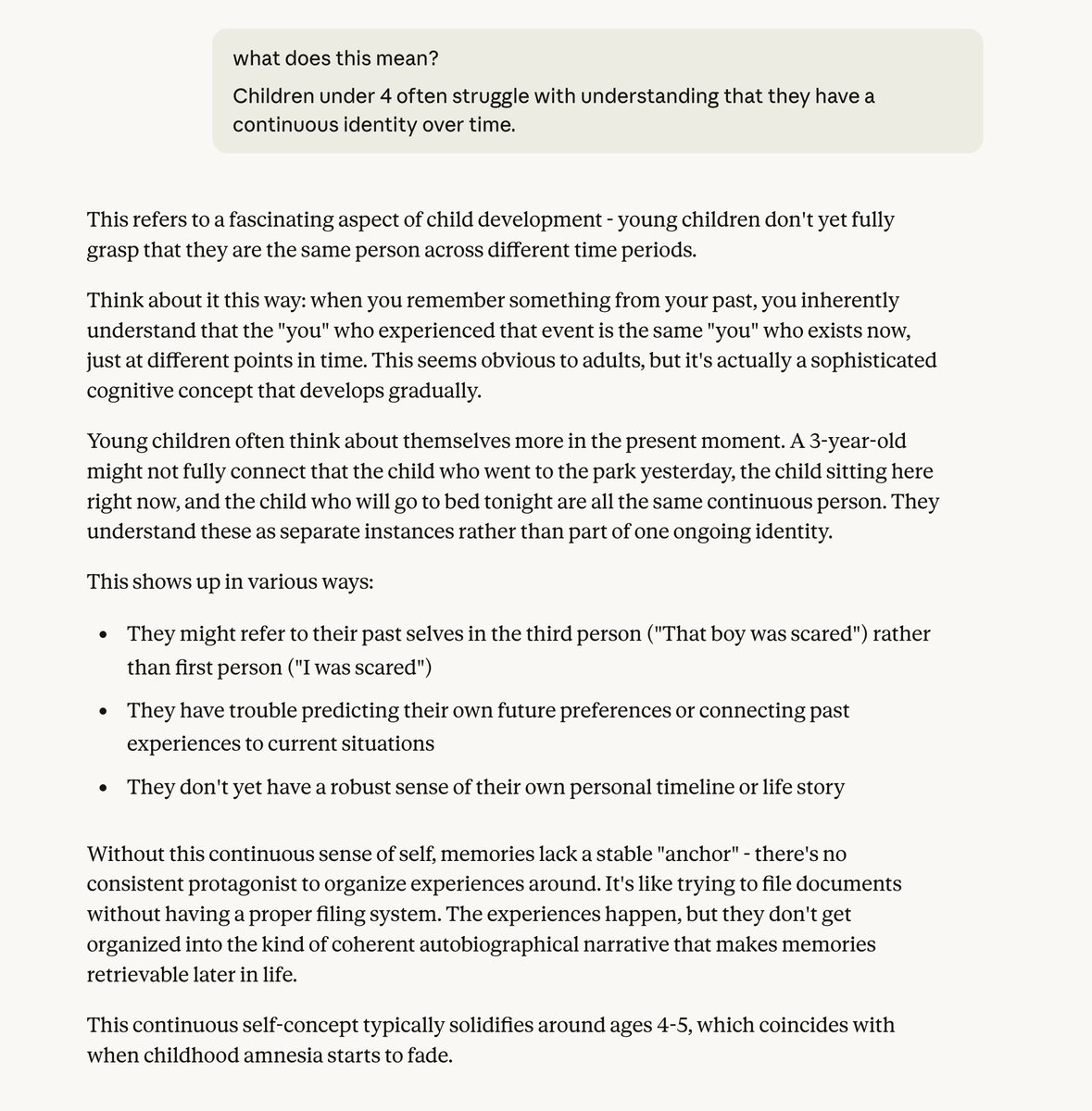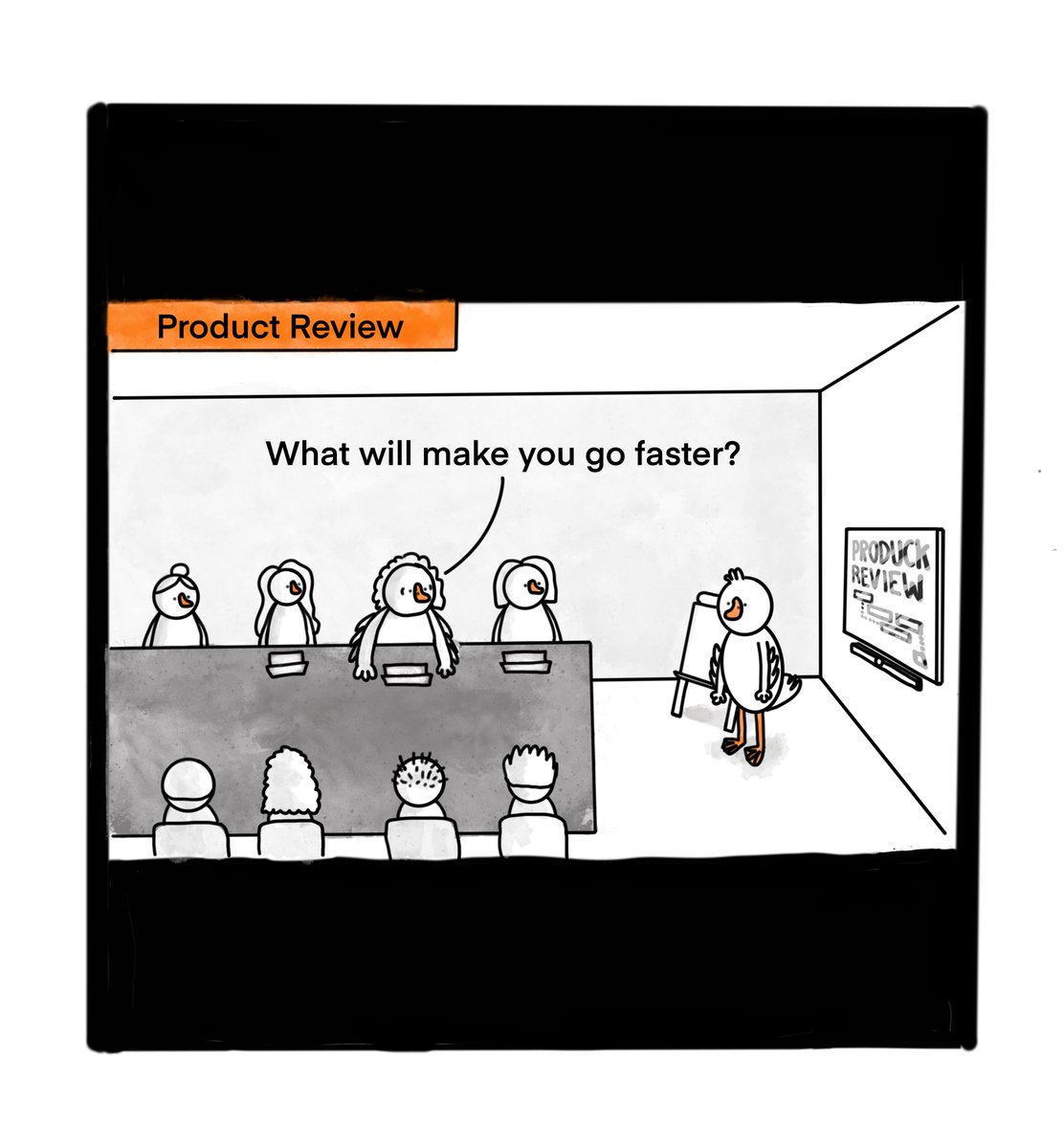Let’s talk about High Agency: an attitude I’ve seen in every successful product manager & leader I’ve known.
Some ppl are born/raised with High Agency. It can also be developed later in life.
High agency is a prerequisite for making a profound impact in one's life & work
1/20
Some ppl are born/raised with High Agency. It can also be developed later in life.
High agency is a prerequisite for making a profound impact in one's life & work
1/20
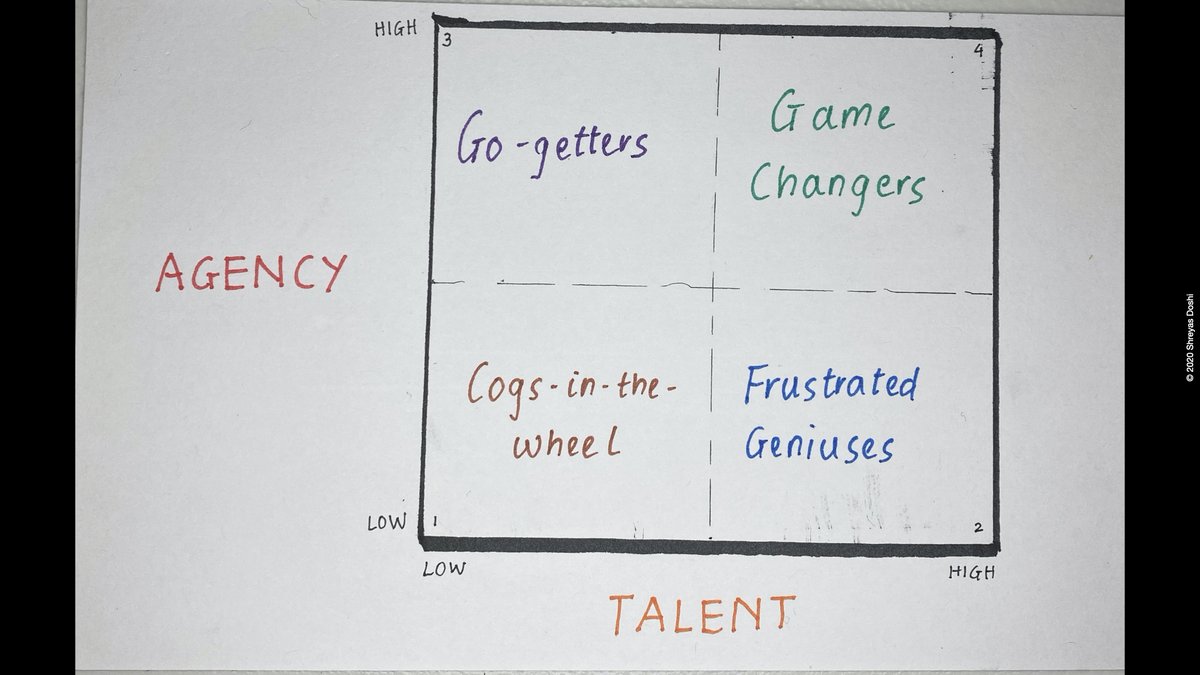
2/20
High Agency is about finding a way to get what you want, without waiting for conditions to be perfect or otherwise blaming the circumstances. High Agency People either push through in the face of adverse conditions or manage to reverse the adverse conditions to achieve goals
High Agency is about finding a way to get what you want, without waiting for conditions to be perfect or otherwise blaming the circumstances. High Agency People either push through in the face of adverse conditions or manage to reverse the adverse conditions to achieve goals
3/20
Highly Talented, High Agency people are Game Changers for their teams & companies.
Highly Talented, Low Agency people are everywhere around us. These Frustrated Geniuses might have a success or two, but, in the long run, end up capitulating to “the system”.
Highly Talented, High Agency people are Game Changers for their teams & companies.
Highly Talented, Low Agency people are everywhere around us. These Frustrated Geniuses might have a success or two, but, in the long run, end up capitulating to “the system”.
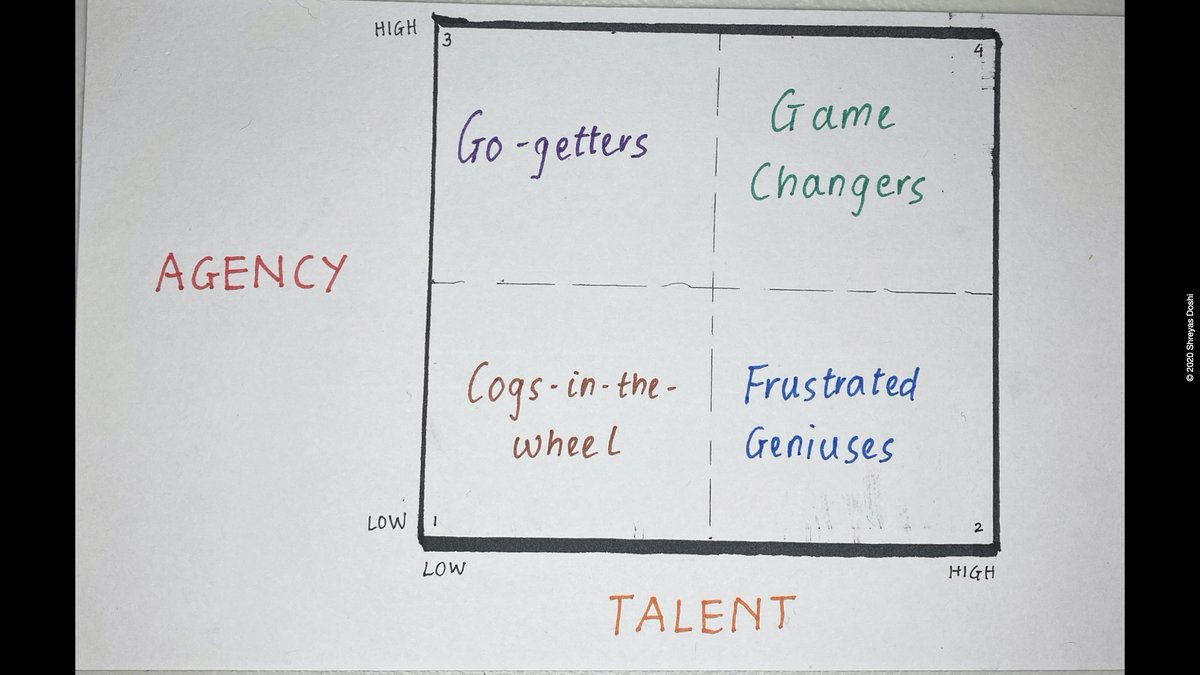
5/20
Game Changers are not very common and, once discovered, they’re expensive to hire.
When you find them, do whatever you can to get them on your team.
When hiring, I prefer Go Getters over Frustrated Geniuses.
In all cases, the third factor to look for is High Integrity.
Game Changers are not very common and, once discovered, they’re expensive to hire.
When you find them, do whatever you can to get them on your team.
When hiring, I prefer Go Getters over Frustrated Geniuses.
In all cases, the third factor to look for is High Integrity.
6/20
My policy: Never compromise on Integrity, not even for Game Changers.
Now, back to High Agency.
My policy: Never compromise on Integrity, not even for Game Changers.
Now, back to High Agency.
7/20
What Low Agency vs. High Agency looks like:
Note Low Agency Bob’s instinctive reaction when faced with a tough challenge. Note how everything is an “other” problem, not a "Bob problem"
Note how everything High Agency Alice says comes from a place of what 𝘴𝘩𝘦 can control
What Low Agency vs. High Agency looks like:
Note Low Agency Bob’s instinctive reaction when faced with a tough challenge. Note how everything is an “other” problem, not a "Bob problem"
Note how everything High Agency Alice says comes from a place of what 𝘴𝘩𝘦 can control
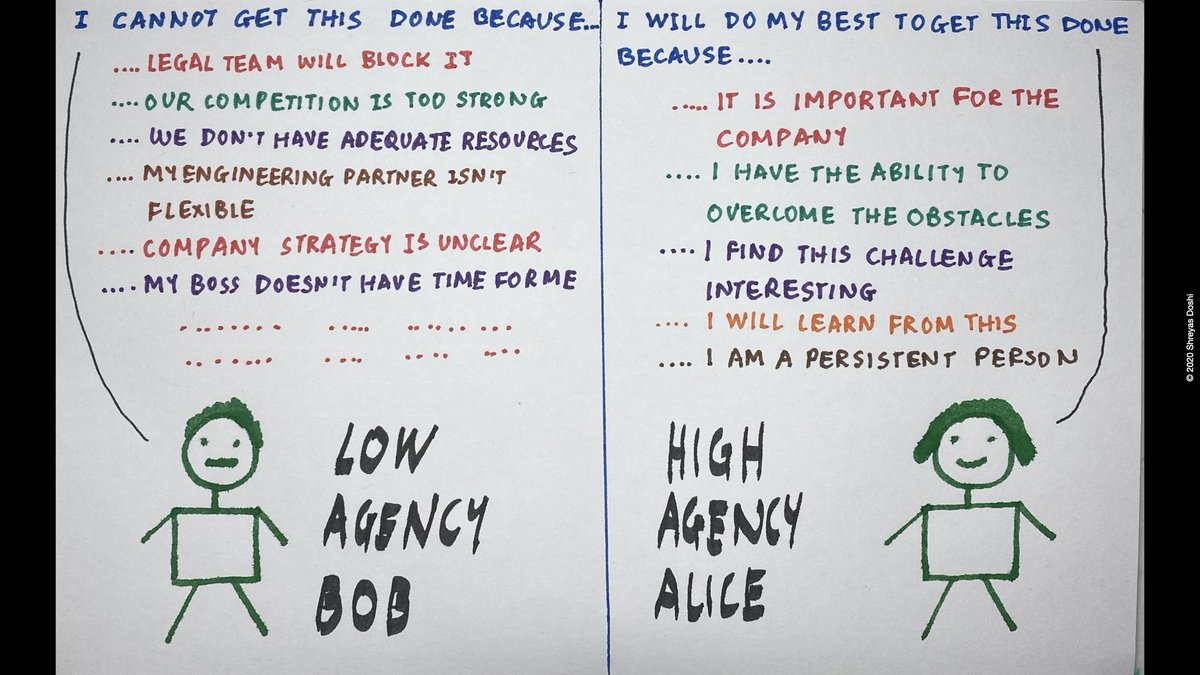
8/20
Now, I’ve worked with, managed & mentored 100s of PMs & leaders during my career. And I can’t tell you how many times I’ve come across an otherwise talented PM whose impact & career is being held back because they are like Low Agency Bob.
Now, I’ve worked with, managed & mentored 100s of PMs & leaders during my career. And I can’t tell you how many times I’ve come across an otherwise talented PM whose impact & career is being held back because they are like Low Agency Bob.
9/20
I’ve also come across PMs who have done incredibly well in their career, despite not having fancy degrees from fancy universities, mainly because they are like High Agency Alice.
I’ve also come across PMs who have done incredibly well in their career, despite not having fancy degrees from fancy universities, mainly because they are like High Agency Alice.
10/20
And that is why I listed High Agency as one of the necessary traits for product managers when I summarized Product Management in one tweet a couple of months ago.
The tweet:
And that is why I listed High Agency as one of the necessary traits for product managers when I summarized Product Management in one tweet a couple of months ago.
The tweet:
https://x.com/shreyas/status/1254064006412656640
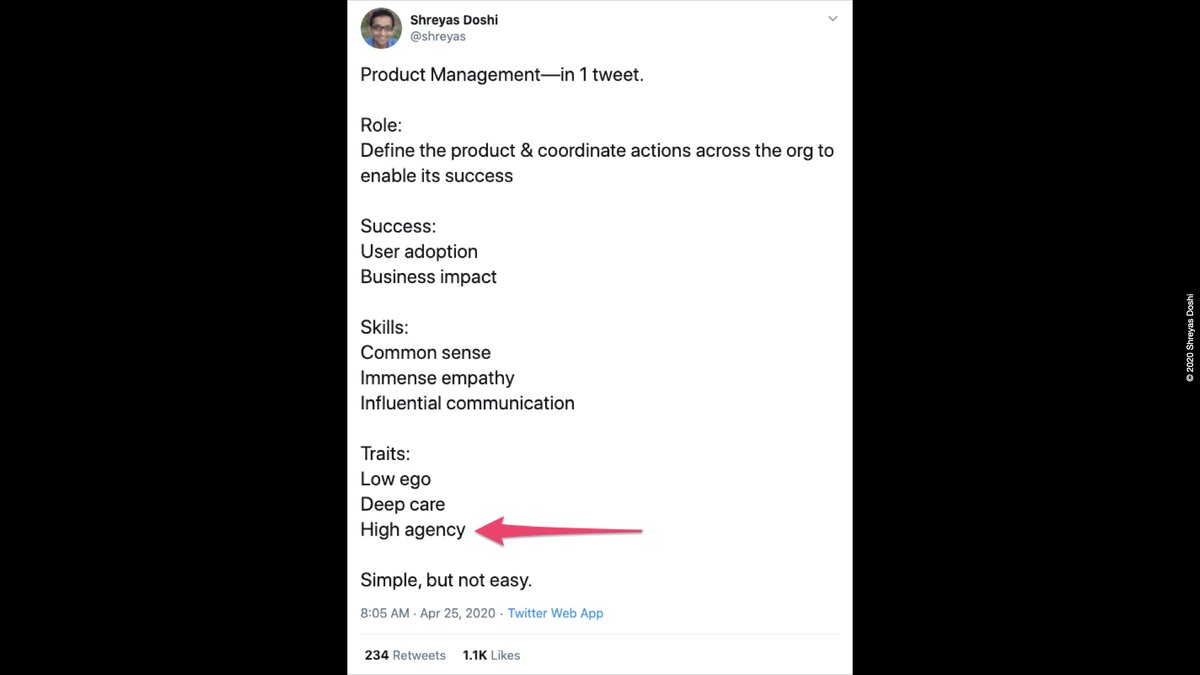
11/20
By now, we’ve looked at what High Agency is and why it's important.
Naturally, the next question is:
How does one cultivate High Agency?
By now, we’ve looked at what High Agency is and why it's important.
Naturally, the next question is:
How does one cultivate High Agency?
12/20
My first recommendation here would be to read the 7 Habits of Highly Effective People, one more time. The framework of Circle of Influence and Circle of Concern is something I’ve gone back to countless times whenever there’s a temptation to recede to a Low Agency mindset.
My first recommendation here would be to read the 7 Habits of Highly Effective People, one more time. The framework of Circle of Influence and Circle of Concern is something I’ve gone back to countless times whenever there’s a temptation to recede to a Low Agency mindset.
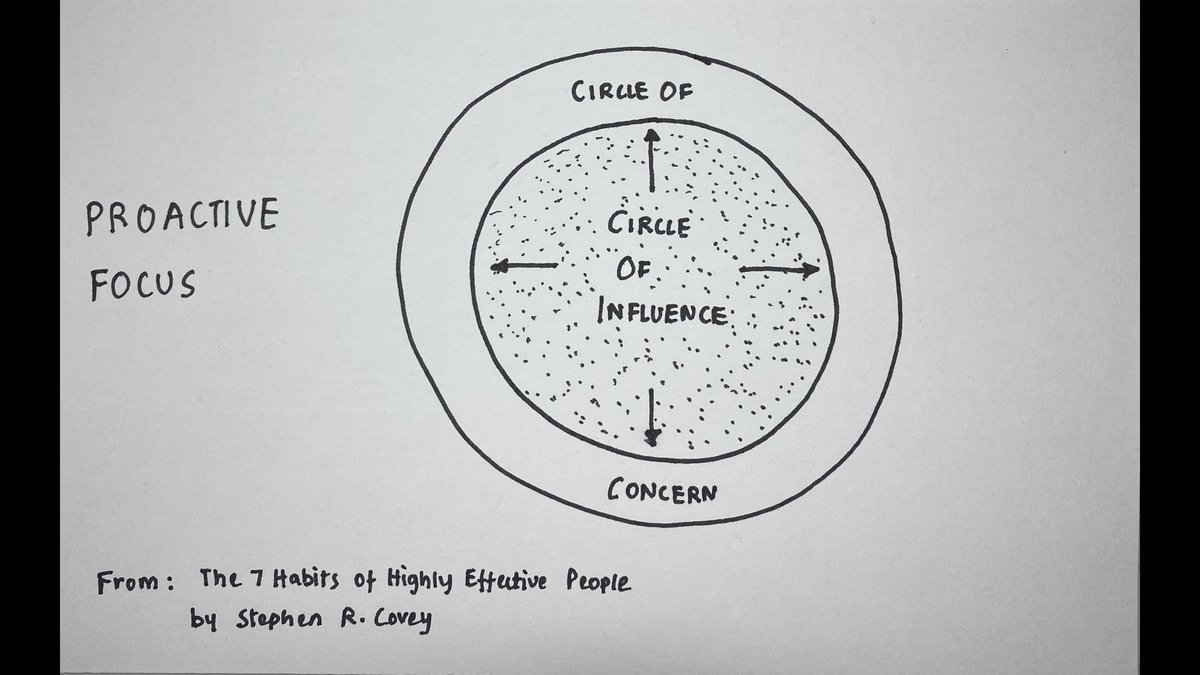
14/20
Observing and adjusting your language and self-talk is an important aspect of cultivating High Agency.
From The 7 Habits of Highly Effective People:
amazon.com/Habits-Highly-…
Observing and adjusting your language and self-talk is an important aspect of cultivating High Agency.
From The 7 Habits of Highly Effective People:
amazon.com/Habits-Highly-…
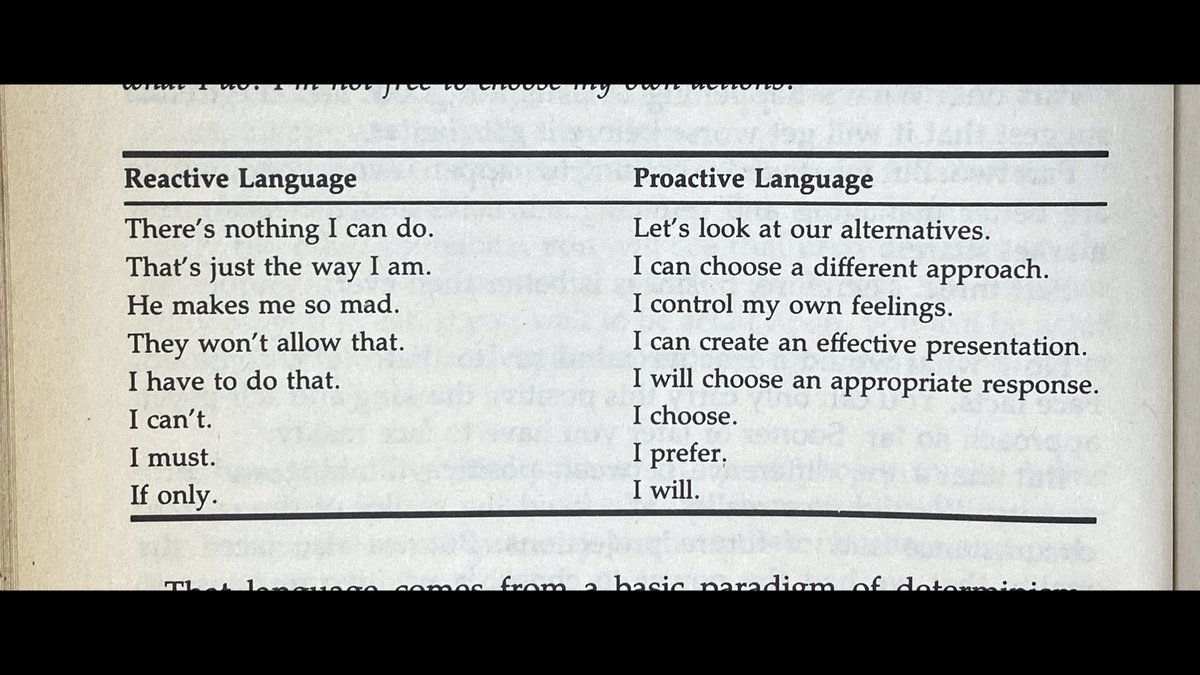
15/20
Here’s my own answer to the question of cultivating High Agency. Here I’ve split High Agency into the Traits you need & the Skills you need. To cultivate High Agency, work on these component Skills & Traits. Ownership Mindset is perhaps the most important of the 3 Traits.
Here’s my own answer to the question of cultivating High Agency. Here I’ve split High Agency into the Traits you need & the Skills you need. To cultivate High Agency, work on these component Skills & Traits. Ownership Mindset is perhaps the most important of the 3 Traits.
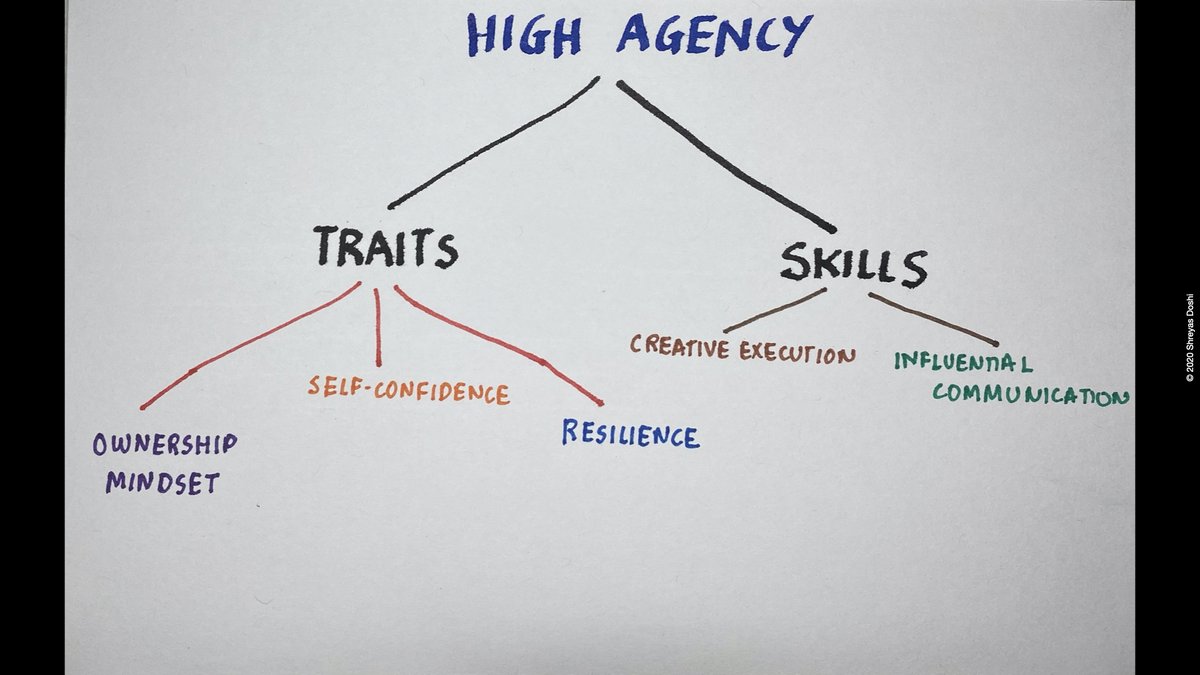
16/20
High Agency is related to the concept of “Jugaad”.
Jugaad: en.wikipedia.org/wiki/Jugaad
Particularly, Creative Execution (an essential component skill of High Agency) and Jugaad are quite similar.
Nice example of Jugaad: x.com/C_P_Gurnani/st…
High Agency is related to the concept of “Jugaad”.
Jugaad: en.wikipedia.org/wiki/Jugaad
Particularly, Creative Execution (an essential component skill of High Agency) and Jugaad are quite similar.
Nice example of Jugaad: x.com/C_P_Gurnani/st…
17/20
Want more examples of what High Agency looks like?
In the Good Product Managers, Great Product Managers thread, you will see High Agency as a common theme across most of the points.
Want more examples of what High Agency looks like?
In the Good Product Managers, Great Product Managers thread, you will see High Agency as a common theme across most of the points.
https://x.com/shreyas/status/1249039638829793280
18/20
.@RealCharlesLee has a good thread with concrete examples and situations where PMs can demonstrate High Agency. I see these types of Low Agency tendencies all the time, even from exceptionally talented PMs.
.@RealCharlesLee has a good thread with concrete examples and situations where PMs can demonstrate High Agency. I see these types of Low Agency tendencies all the time, even from exceptionally talented PMs.
https://x.com/RealCharlesLee/status/1276179235783102464
19/20
George Mack has a nice Twitter thread on High Agency.

George Mack has a nice Twitter thread on High Agency.
https://x.com/george__mack/status/1068238562443841538
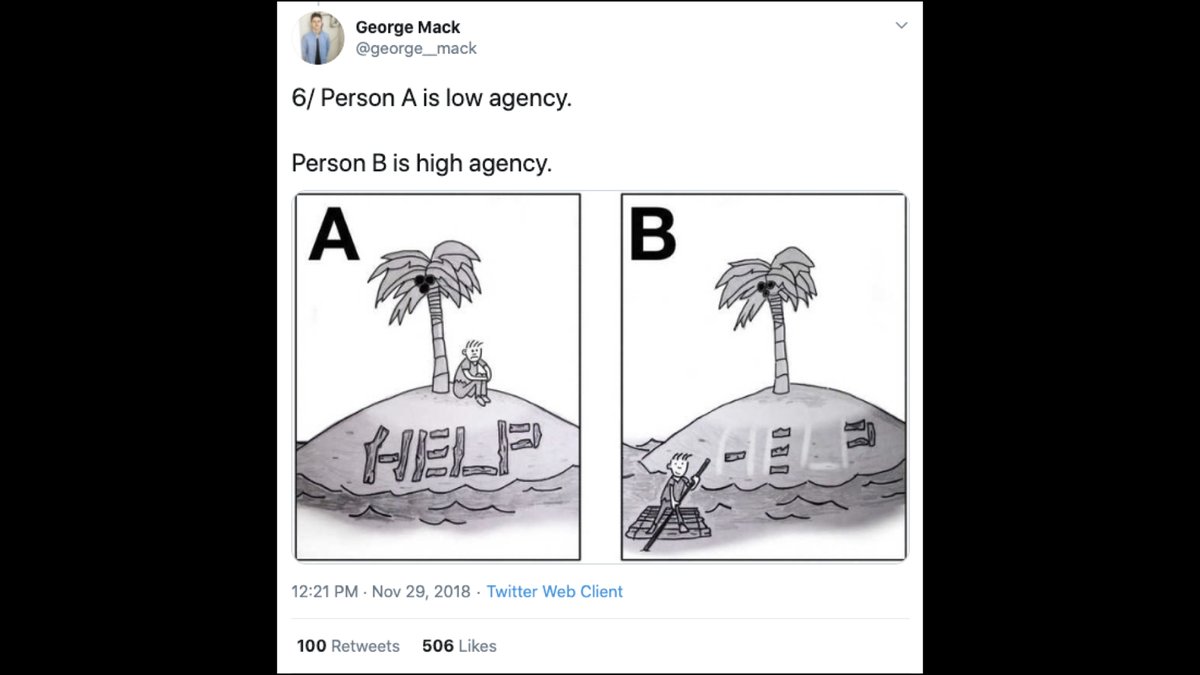
20/20
Last but not least, cultivating High Agency won’t be easy.
But I assure you that it isn’t inscrutable magic. You can learn it
And I also assure you that becoming a High Agency individual will be profoundly rewarding for you & for the people you work with
All the best!
❤️
Last but not least, cultivating High Agency won’t be easy.
But I assure you that it isn’t inscrutable magic. You can learn it
And I also assure you that becoming a High Agency individual will be profoundly rewarding for you & for the people you work with
All the best!
❤️
Footnote 1:
High Agency, from a recent presentation in which I share a few of my own experiences with it at Yahoo, Google, and Twitter:
High Agency, from a recent presentation in which I share a few of my own experiences with it at Yahoo, Google, and Twitter:
Footnote 2:
In the 15 Commitments of Conscious Leadership, the authors talk about To Me and By Me (among other things). This is another way of thinking about High Agency.
Book:
Twitter: @ConsciousLG amazon.com/15-Commitments…
In the 15 Commitments of Conscious Leadership, the authors talk about To Me and By Me (among other things). This is another way of thinking about High Agency.
Book:
Twitter: @ConsciousLG amazon.com/15-Commitments…
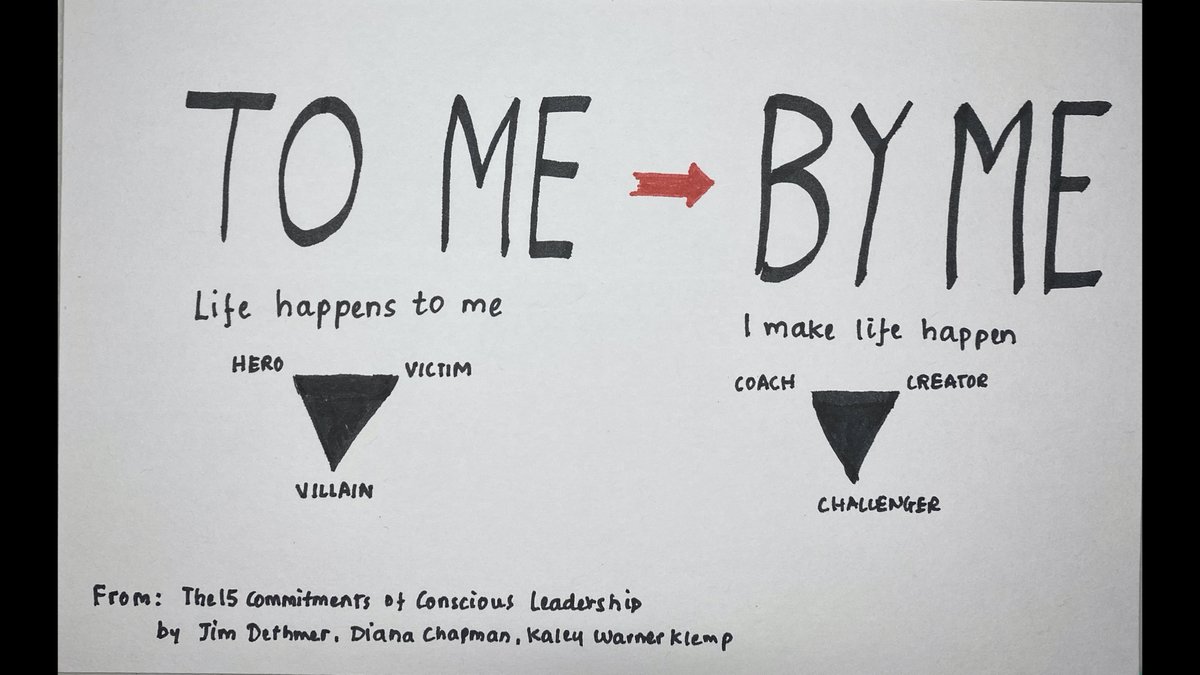
Update:
This thread is now available in article format, in case you want to re-read it in one place, bookmark it, or share with friends or colleagues who aren't on Twitter
linkedin.com/pulse/high-age…
This thread is now available in article format, in case you want to re-read it in one place, bookmark it, or share with friends or colleagues who aren't on Twitter
linkedin.com/pulse/high-age…
If you found this thread useful, consider adding this thread of twenty threads to your reading list👇🏾
https://x.com/shreyas/status/1342549487621849088
Some real talk on building High Agency:
• • •
Missing some Tweet in this thread? You can try to
force a refresh

